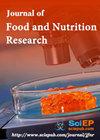肥胖患者的营养补充剂及其对人体测量、代谢和炎症参数的影响
IF 0.6
4区 农林科学
Q4 FOOD SCIENCE & TECHNOLOGY
引用次数: 0
摘要
本研究的目的是评估Metabolic®Ultra,一种含有壳聚糖和α-硫辛酸的营养品(营养品),是否可以减少人体测量,改善肥胖患者的代谢值、炎症状态和细胞因子参数。我们招募了60名高加索肥胖(BMI≥30 kg/m2)非糖尿病患者,年龄≥18岁,无论男女。在随机、双盲、安慰剂对照设计中,患者被随机分配服用安慰剂或营养品6个月。营养品和安慰剂每天两次,午餐和晚餐前15分钟服用3片。体重、BMI和Abd显著下降。与安慰剂相比,在营养治疗6个月后观察到Circ.(与基线相比p<0.05)。两组均未观察到腰围和臀围的变化。与基线相比,两组的FPG、FPI和Homa指数均无变化。与安慰剂组相比,营养药组在6个月时TC、LDL-C和Tg显著降低(分别与基线组相比,p<0.05),并且与安慰剂组比较,在6个月中TC和LDL-C显著降低(各自p<0.05。尽管有增加的趋势,但在营养品组中没有观察到显著的HDL-C变化。在6个月时,营养药组的高敏C反应蛋白显著降低(与基线相比,p<0.05,与安慰剂相比,p>0.05),而ADN在营养药组提高到6个月(与基线比较,p<0.05vs安慰剂)。在研究结束时,两种治疗的IL-6和TNF-α均未出现显著变化。所有完成研究并在基线和6个月后接受OGTT的患者在第二小时结束时血糖正常。我们可以得出结论,含有壳聚糖和α-硫辛酸的营养品有助于减轻体重和BMI,改善脂质状况,降低炎症参数,而不会影响肥胖患者的血糖状况。本文章由计算机程序翻译,如有差异,请以英文原文为准。
Nutraceutical Supplementation in Obese Patients and Effects on Anthropometric, Metabolic, and Inflammatory Parameters
The aim of this study was to evaluate if Metabolic® Ultra, a nutraceutical containing Chitosan and α-Lipoic acid (Nutraceutical), can decrease anthropometric measures and ameliorate metabolic values, inflammatory status, and cytokine parameters in patients with obesity. We enrolled 60 Caucasian obese (BMI ≥ 30 kg/m 2 ) nondiabetic patients, aged ≥ 18 of either sex. Patients were randomized to take placebo or Nutraceutical for 6 months, in a randomized, double-blind, placebo-controlled design. Nutraceutical and placebo were self-administered twice a day, 3 tablets fifteen minutes before lunch and dinner. A significant decrease of weight, BMI, and Abd. Cir. were observed after 6 months of Nutraceutical treatment (p< 0.05 vs Baseline) compared to placebo. No Waist Cir. and Hip Cir. variations were observed in both groups. No variation of FPG, FPI, and Homa index were recorded in both groups compared to Baseline. A significant TC, LDL-C, and Tg decrease was recorded at 6 months in the Nutraceutical group compared to the placebo group (p< 0.05 vs Baseline, respectively), and a significant TC, and LDL-C decrease was found at 6 months compared to placebo group (p< 0.05, respectively). No significant HDL-C variation was observed in the Nutraceutical group, although there was an increasing trend. High-sensitivity C-reactive protein was significantly reduced at 6 months in the Nutraceutical group (p< 0.05 vs Baseline, and p< 0.05 vs placebo), while the ADN was raised to 6 months in the Nutraceutical group (p< 0.05 vs Baseline, and p< 0.05 vs placebo). No significant change was seen for IL-6 and TNF-α at the end of the study in both treatments. All the patients who finished the study and underwent OGTT at Baseline and after 6 months were euglycemic at the end of the second hour in both groups. We can conclude that a nutraceutical containing Chitosan and α-Lipoic acid can be helpful in reducing weight and BMI, in improving lipid profile, and in reducing inflammatory parameters, without affecting the glycemic status of obese patients.
求助全文
通过发布文献求助,成功后即可免费获取论文全文。
去求助
来源期刊

Journal of Food and Nutrition Research
农林科学-食品科技
CiteScore
1.60
自引率
9.10%
发文量
0
审稿时长
1 months
期刊介绍:
Journal of Food and Nutrition Research (JFNR) publishes papers focusing on fundamental and applied research in chemistry, physics, microbiology, nutrition aspects, bioactivity, quality, safety, and technology of foods.
 求助内容:
求助内容: 应助结果提醒方式:
应助结果提醒方式:


